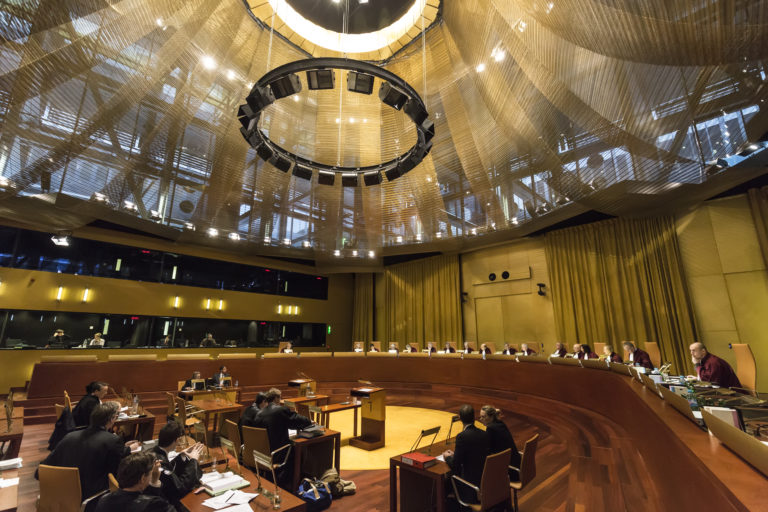
The European General Court has ruled that exiled Catalan MEPs Carles Puigdemont, Toni Comín and Clara Ponsatí cannot maintain their parliamentary immunity, dismissing their lawsuit against the European Parliament’s approval of a waiver of immunity.
The European General Court (EGC) has stripped Carles Puigdemont, Toni Comín and Clara Ponsatí of their parliamentary immunity. The EGC ruling dismisses the MEPs’ lawsuit against the waiver of immunity approved by the European Parliament, opening the door for judge Pablo Llarena to reactivate or issue new European arrest warrants against the Catalan exiles.
The waiver of immunity had been approved for a European arrest warrant that no longer exists, for the crimes of sedition and embezzlement. That is why Llarena withdrew them last January, as they had expired. Sedition has been repealed from the Spanish Criminal Code, hence the defence of the exiles believes that the judge needs to ask for a new waiver of immunity for the crimes of aggravated misuse of public funds.
The Catalan National Assembly is concerned to see that the European General Court has turned a blind eye to all the irregularities that show that the request of the waiver of immunity was politically motivated and totally lacked impartiality. The president of the Committee on Legal Affairs was Adrián Vázquez of Spanish nationalist party Ciudadanos, and the speaker was Angel Djambazki, a neo-Nazi who had taken part in an event held by far-right VOX. More recently, after the long overdue repeal of the crime of sedition, Spanish PM Pedro Sánchez publicly boasted that the reform of the Penal Code would finally allow Puigdemont’s extradition to Spain, highlighting the connivance between the judicial and political powers to persecute the Catalan pro-independence movement.
Assemblea president Dolors Feliu has travelled to Brussels this morning in support of the Catalan exiles where she has expressed that the Catalan National Assembly is fighting side by side with the exiles, but also “in favour of all those fighting for freedom in the whole of Europe.” Feliu also recalled that the judicial proceedings are far from over, since “an appeal may be brought before the Court of Justice of the European Union, which has often recognized rights that the EGC had not, and which we hope will be the case here.”
It is evident that the waiver of immunity arose from political persecution against pacific dissidence. There has been an abuse of political rights by the Spanish authorities that even UN bodies have confirmed. The UN Human Rights Committee found that Spain had violated the political rights of former members of the Catalan Government and Parliament under Article 25 of the International Covenant on Civil and Political Rights by suspending them from public duties prior to a conviction for organising the October 1st 2017 independence referendum. Not only were their individual political rights abused, but also those of all those Catalan citizens who had voted for them.
Catalan citizens are suffering a systemic violation of their fundamental rights just because they want to exercise their right to self-determination, which is recognized by international law. There have been constant attempts by the Spanish authorities to silence, delegitimize and criminalize the Catalan pro-independence movement through false claims of terrorism and by judicial persecution.
It is extremely concerning that a state where such blatant abuses of fundamental rights against innocent citizens continue taking place is currently holding the presidency of the Council of the European Union. This weakens the credibility of the project of the European Union and its institutions.
We can only hope that in the event that judge Llarena issues new European arrest warrants, the judicial authorities will pay greater heed to the deficiencies of the Spanish judiciary and reject them. As the European Court of Justice (ECJ) ruled in January, EAWs can be rejected if there are deficiencies “that affects the judicial protection of an objectively identifiable group of people,” which the Catalan minority is.
The judicial battle of Catalonia’s pro-independence movement is far from over, but as former Catalan president Carles Puigdemont has stated, if this morning’s sentence is not reversed, minorities defending causes that are inconvenient for the states will have greater difficulty in exercising their rights: “today, political dissent is under greater threat in Europe.”
The Catalan National Assembly reaffirms its commitment to achieving Catalonia’s independence. Only the Catalan Republic can guarantee the protection of fundamental rights of the Catalan people and the survival of the Catalan nation, its language and its culture.